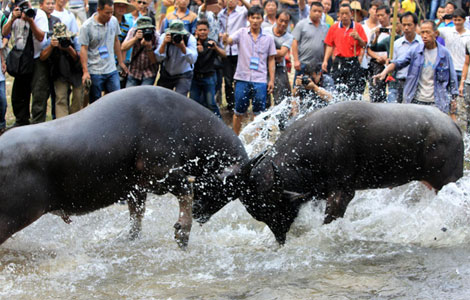Analysts: Li visit will boost cooperation
Updated: 2013-10-04 23:19
By Zhou Wa (China Daily)
|
||||||||
Premier Li Keqiang will attend a meeting of East Asian leaders and pay an official visit to Brunei, Thailand and Vietnam from Oct 9 to 15, Foreign Ministry spokesman Qin Gang said on Friday.
Together with President Xi Jinping’s ongoing trip to Indonesia and Malaysia, Li’s visit shows the importance China attaches to the region and will further stabilize the situation in the region, and upgrade cooperation to a new high level, analysts said.
“With the visits, China hopes to show members of the Association of Southeast Asian Nations that it is a dependable partner of these countries,” said Ruan Zongze, vice-president of the China Institute of International Studies.
“Beijing wants to show its neighbors that China hopes to promote a stable atmosphere for win-win cooperation, and that cooperation with China will bring more opportunities,” he added.
Wang Yizhou, a professor of global studies at Peking University, said: “China’s ties with Southeast Asian countries are subtle at the moment, given the disturbing South China Sea issue, but the visits show China’s determination and confidence to thoroughly resolve the issue.”
In Brunei, the ASEAN chair country in 2013, Li will attend the 16th China-ASEAN leaders’ meeting, the 16th ASEAN plus three (China, Japan and South Korea) summit and the eighth East Asia Summit.
Li will explain the ASEAN policy implemented by the new generation of Chinese leaders and tell ASEAN countries that Beijing will further develop a strategic partnership with them, resolve disputes through political dialogue, and jointly maintain regional peace and stability with them, Xinhua News Agency reported on Friday.
Li will also explore new possibilities for cooperation with leaders from ASEAN countries, including upgrading the free trade deal, building up the Regional Comprehensive Economic Partnership and establishing a framework for investment and funding as well as credit rating, Xinhua said.
Although Asian countries demonstrate a momentum for continued growth, the risk of economic downturn still exists in these countries, so China and ASEAN countries need new mechanisms to maintain the favorable momentum, Ruan said.
“A portal for investment and funding will be highly welcomed by ASEAN countries, which can offer capital guarantees to those countries to implement their projects for continuing economic development and improving infrastructure and connectivity with each other,” he said.
With such a mechanism, cooperation between China and the ASEAN can be intensified, he added.
“To deepen cooperation, China and the ASEAN should also control the risks brought by some political and security problems, such as the South China Sea issue,” said Wang from Peking University.
Li is due to discuss the issue with leaders from Southeast Asian countries during his upcoming trip.
China and ASEAN countries should not let the South China Sea issue harm their favorable cooperation, said Wang.
But the issue only plays a small part in China-ASEAN ties, with cooperation being the major element of the ties, he added.
This year marks the 10th anniversary of the establishment of a strategic partnership between China and the ASEAN. China and ASEAN countries have enjoyed sound relations and cooperation since the establishment.
So far, China is the top trading partner of the ASEAN, while ASEAN ranks as China’s third-largest trading partner. Bilateral trade has grown from $55 billion in 2002 to more than $400 billion last year.
- China and ASEAN to handle territorial issues like friends
- China to build community of common destiny with ASEAN
- China should increase investment in ASEAN
- China vows to build community of common destiny with ASEAN
- Indonesia key to upgrading China-ASEAN relations
- Philippine President to attend APEC, ASEAN meetings

 Catholic conclave abides in Tibetan village
Catholic conclave abides in Tibetan village
 Travel highlights during Golden Week
Travel highlights during Golden Week
 Buddhist Art at the gateway of the Silk Road
Buddhist Art at the gateway of the Silk Road Embracing innovation
Embracing innovation
 Search for a cup holder's identity
Search for a cup holder's identity
 China and Malaysia set blueprint to boost ties
China and Malaysia set blueprint to boost ties
 China Open: Li Na loses 1-2 to Petra Kvitova
China Open: Li Na loses 1-2 to Petra Kvitova
 A holiday without much fun
A holiday without much fun
Most Viewed
Editor's Picks

|

|

|

|

|

|
Today's Top News
China tops APEC CEOs' picks for investment: survey
Man burns self on National Mall in Washington DC
UN aviation body reaches deal on carbon emissions
Republicans hang tough in standoff over shutdown
Italy's senate panel votes Berlusconi's expulsion
Trending news across China
China, Malaysia to boost ties
ZTE aims at bigger share in neighbors
US Weekly

|

|





